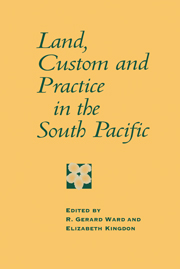Book contents
- Frontmatter
- Contents
- List of Figures
- List of Tables
- Contributors
- Acknowledgements
- Introduction
- 1 Land Use and Tenure: Some Comparisons
- 2 Land Tenure in the Pacific Islands
- 3 Breathing Spaces: Customary Land Tenure in Vanuatu
- 4 From Corporate to Individual Land Tenure in Western Samoa
- 5 Right and Privilege in Tongan Land Tenure
- 6 Land, Law and Custom: Diverging Realities in Fiji
- 7 Beyond the Breathing Space
- Bibliography
- Index
3 - Breathing Spaces: Customary Land Tenure in Vanuatu
Published online by Cambridge University Press: 10 November 2009
- Frontmatter
- Contents
- List of Figures
- List of Tables
- Contributors
- Acknowledgements
- Introduction
- 1 Land Use and Tenure: Some Comparisons
- 2 Land Tenure in the Pacific Islands
- 3 Breathing Spaces: Customary Land Tenure in Vanuatu
- 4 From Corporate to Individual Land Tenure in Western Samoa
- 5 Right and Privilege in Tongan Land Tenure
- 6 Land, Law and Custom: Diverging Realities in Fiji
- 7 Beyond the Breathing Space
- Bibliography
- Index
Summary
In 1980, the newly independent country of Vanuatu abolished all freehold land ownership and returned the alienated land to its ‘custom owners’. To a greater extent than any other island country Vanuatu has emphasised customary land tenure in its constitution and nation building (Fingleton, 1982). In part because of differences in its colonial history, and despite extensive alienation of land to foreigners prior to independence, it has gone further than most Pacific Island states in limiting free market ownership of land. In 1980, Vanuatu became the only Melanesian country to dissolve the colonial dualism of ‘customary’ (or ‘native’) land and ‘alienated’ land (Larmour, 1984:38). Rejecting its twin official colonial names, New Hebrides/Nouvelles-Hébrides, the country took a name which means ‘our land’. Through the constitution, ownership of all land reverted to the ‘custom owners’. These can be defined as indigenous individuals or groups whose ownership claims are based on customary principles and practices.
Dissolution of the colonial dualism of customary and alienated land is important in two ways. First, it suggests that the idea of land inalienability was as fundamental to the leaders of the independence movement as the idea of land acquisition had been to European colonial involvement in the islands. ‘By 1905 one company, the Société Française des Nouvelles Hébrides (SFNH) claimed over … fifty-five per cent of the archipelago’ (Lane, 1971:257). Although the scale of such claims was unprecedented in islanders' experience, Europeans were not alone in amassing large holdings. Customary warrior leaders took some land from those they vanquished and more from loyal, intimidated followers.
- Type
- Chapter
- Information
- Land, Custom and Practice in the South Pacific , pp. 65 - 108Publisher: Cambridge University PressPrint publication year: 1995
- 7
- Cited by



